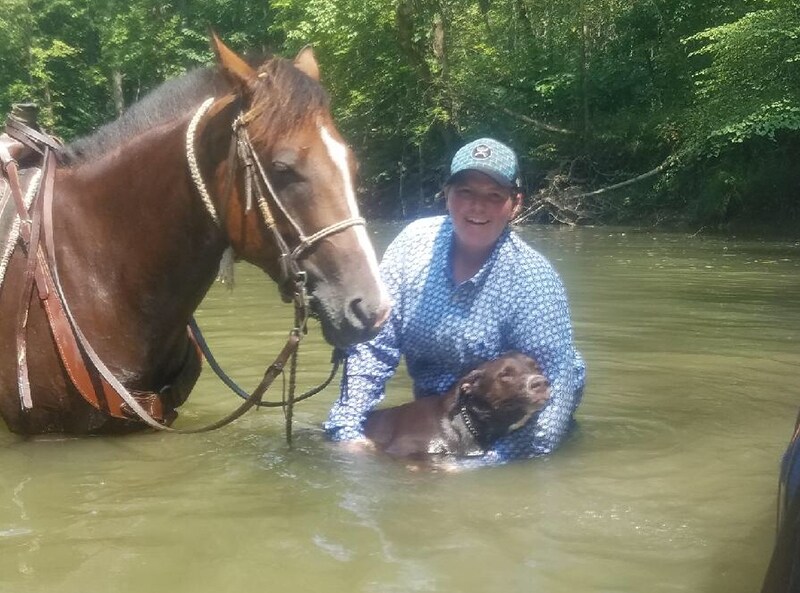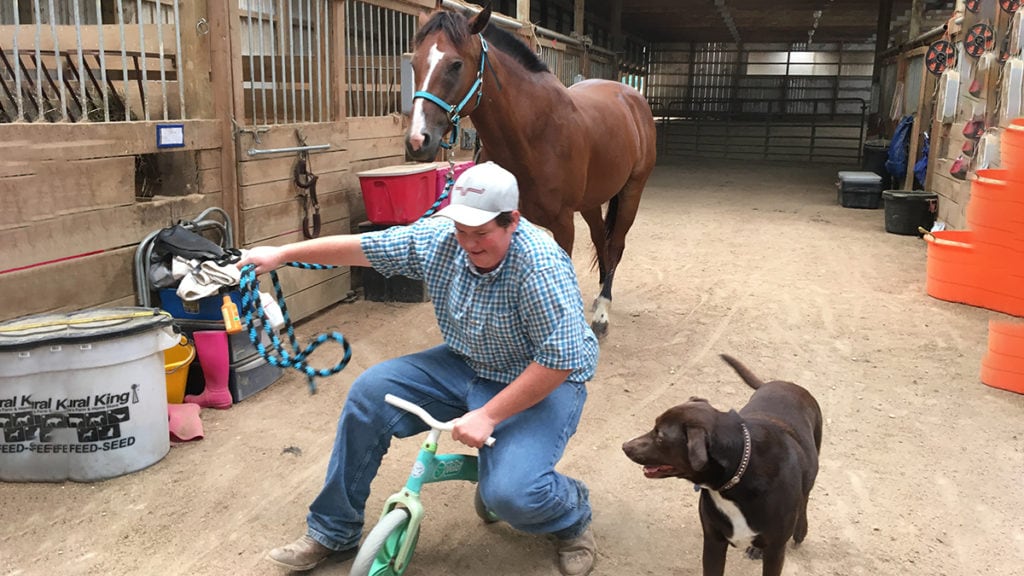At only 3 months old, Wade suffered a tragic accident. The young puppy was doing a training session with his owner, Kat Ennis, when he dislocated his hip. Wade’s injury ultimately required surgery with years of pain management medicine. Unfortunately, the drugs would take a toll on the dog’s liver and kidney function; it was unlikely that he would live for more than three or four years.
“If he lived five years, it would be a miracle,” Ennis says.
Ennis was persistent in helping the pup not only live, but also have a better quality of life. After many options, Ennis turned to Hill’s Science Diet, which would prove to be a game changer to Wade’s health. Wade has just celebrated this seventh birthday and now even hits the trails with Ennis and her horse, Punk.
Love at First Sight
Five years ago, Ennis, then 22, was an Indiana girl studying Equine Science at Feather River College in rural Northern California when she met and instantly fell for Wade.
Wade was given to Ennis by her best friend, Tia, who had an unexpected litter of puppies. Tia’s Catahoula Leopard Dog, Spur, had a backyard fling with an uninvited guest, Moe, an Australian cattle dog.

Wade as a puppy. Photo Courtesy of Kat Ennis
Taking after his canine dad, Wade immediately showed the attributes of heelers and became Ennis’ close companion and training pupil. Unfortunately, during one of Wade’s training sessions, he got severely injured. Ennis was teaching the 3-month-old pup how to heel when she lost track of him and fell over him, dislocating his hip.
Wade’s Healing Journey
After the injury, Wade’s hip was put in a sling and he underwent hydrotherapy in the hope the hip would heal naturally.
“He was OK until about six months,” Ennis says.
At about that time, Wade began waking up in the middle of the night in obvious pain.
“Because the bones were growing, they began grinding,” Ennis says.
This put Ennis in a tough position. She couldn’t let Wade go on suffering, but the advanced and expensive surgical options, such as total hip replacements, were out of reach for her financially.
“It’s not something a college kid could afford,” she says.

Photo Courtesy of Kat Ennis
Instead, Ennis opted for a simpler procedure called a femoral head ostectomy, or FHO surgery. The procedure involves removing the head and neck or the “ball and socket” portions of the hip joint.
“He now has a muscle joint instead of a bone joint,” Ennis says.
Although it wasn’t the ideal situation, Ennis says her veterinarian told her it would “give [Wade] another three years.”
To treat the joint and manage post-operative pain, Wade was prescribed a nonsteroidal anti-inflammatory drug (NSAID) called carprofen, which is similar to Tylenol, and Tramadol for when the weather gets particularly cold.
Because carprofen can affect the kidneys and the liver over time—the kidneys are especially at risk with any type of NSAID due to reduced renal plasma flow—Ennis was told that it was unlikely Wade would live for more than three or four years.
Because of these concerns, Wade went to the vet for blood work every six months to monitor his kidney and liver levels.
“Almost two years ago, he was showing early signs of lower kidney levels and higher liver levels,” Ennis says. “He was slowly getting worse.”
Running out of options, Ennis was looking for anything to help Wade.
A New Diet, A New Lease on Life
Before taking him off of carprofen, the vet suggested starting Wade on Hill’s Prescription Diet k/d dog food and rechecking his blood work in a month. According to company literature, the k/d formula was developed by nutritionists and veterinarians specifically to support kidney health.
The diet includes low sodium, controlled phosphorus and high levels of amino acids such as Omega 3 and l-carnitine to improve muscle protein. In addition to protecting dog kidney function, the diet is formulated to protect the heart function and support the ability to build lean muscle.
After about three months on his new Hill’s Prescription Diet, Wade was back in the normal range for both kidney and liver function. And now he’s back to his 6-month check-up routine.

Photo Courtesy of Kat Ennis
Ennis credits Hill’s prescription dog food diet with keeping Wade’s kidney and liver functions strong. As she understands it, the diet “helps the kidneys flush out better.”
Living His Best Life
These days, Ennis, 27, works as an animal care technician at a shelter in Bloomington, Indiana, and Wade celebrated his seventh birthday in November.
Ennis tries to balance Wade’s winter activity to keep his hip comfortable, and the slower life is not all bad for the otherwise active dog. Occasionally, Ennis takes Wade to her parents’ home where he gets to check out their hot tub.
“He’s a big-time water dog,” Ennis says. “He cannot get enough.”

Photo Courtesy of Kat Ennis
Wade already has lived long beyond expectations, and Ennis says she will cherish every extra day she gets with him. There will be an inevitable time when the meds and his kidneys stop working, but Ennis says: “Until then, he’s as happy-go-lucky as ever.”
When the weather warms, Ennis, Punk and Wade will be found at Blackwell Horsecamp in Hoosier National Forest, riding the trails and swimming in the river.
By: Greg Mellen
Share:










